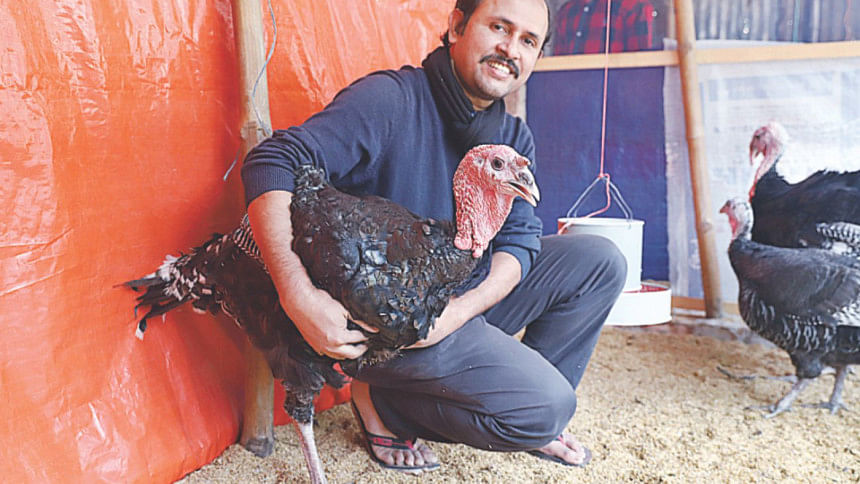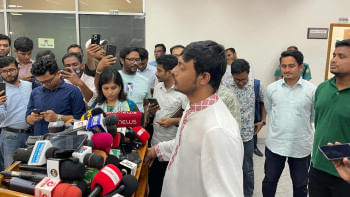Turning towards turkeys

Growing up next to a hatchery, Bablu Chowdhury, a resident of Dhaka's Savar upazila, aspired to one day own a hatchery of his own.
His determination led him to finally realise his dream. Today, he is the owner and chief executive officer of the hatchery named Setara Farm, situated in Shimultala area of Savar.
At present, he produces around 8,000 chicks of the North American bird every month. The price he set is also one of the lowest in the market.
However, his road to becoming a successful entrepreneur wasn't easy. A graduate of Statistics from Chittagong University, Bablu's first hurdle was procuring an incubator, the apparatus used to hatch eggs.
An incubator costs around Tk 80,000 while importing the same device from China would set him back by Tk 6-8 lakhs, Bablu said That is when his innovative mind went to work.
Bablu began researching on incubators and turkey hatcheries on the internet. He also read several studies in this regard, which helped him to build the device.
“I was very curious. I searched on the internet and even took suggestions from a Japanese friend through social media to build the device,” he said.
“Building an incubator is not very difficult. But you have to follow some techniques to attain better success rate,” he added.
Bablu had been trying to build his incubator since the 1990s, when he was a student of class IX. After 28 unsuccessful attempts, his hard work finally bore fruit.
His incubator finally came into operation in December of 2017 after passing various tests.
With a capacity of hatching 54,000 eggs per month, it will start production within two months.
“Since childhood, my hobby has been rearing birds and that helped me in my efforts,” he said.
“After building the incubator, I started hatching turkey eggs thinking of expanding my business,” he said.
Comparatively cheaper production cost for turkeys has attracted the country's farmers to the fowl. For instance -- turkeys like to eat green vegetables including various spinach and hyacinth plants, he added.
Bablu, who also has a farm consisting of 400 turkeys in Manikganj, said the bird's meat is more nutritious and tastier than other poultries.
According to United States Department of Agriculture (USDA), turkey meat contains higher protein but three times less fat than chicken. It also contains other nutrients, like iron, zinc and vitamins B and D, in higher amounts compared to chicken.
Bablu's facility not only produces turkey chicks, but also conducts researches on the chick production as well as for improving the incubator.
“I have already achieved the highest success rate of hatching turkey eggs [through research]. I need to research more so that I can reduce the price,” he said.
Bablu sells each one day old chick for Tk 250, which is the lowest in the market. But, he wants to reduce it further for popularising turkey farming in the country.
“I can sell the chicks at the lowest price as production cost is low and I also make less profit. My aim is to create more turkey farmers so that we can establish a particular industry for the bird,” he said.
He also suggested the government go for export of turkey meat, which has a high demand in foreign markets and is very popular among Americans and Europeans.
Tapas Kanti Datta, a veterinarian and livestock expert, said consumption of turkey meat and subsequently its farming is growing day by day. At present, those in the high and middle-income brackets consume the meat.
But it will be popular among all classes if its price can be reduced -- which now stands at Tk 400-500 per kilograms -- through increasing the bird's production, he said.
“Turkey farmers usually hatch the eggs in natural ways or by using hatcheries of other poultries. They can hatch around 60 percent of the eggs, and sell each chick aged one day at Tk 400-600,” said Tapas, also the district livestock officer of Narsingdi.
Bablu's success inspired the Centre for Development Innovation and Practices (CDIP), a non-government organisation, to support him in establishing a bigger incubator and expanding the production to 54,000 eggs per month.
CDIP Director (programme) Fazlul Hoque Khan said, “The chicks Bablu produces are healthier and stronger than others, and he can hatch more than 90 percent of the eggs successfully.”
“The incubator he has built is very modern. Such a machine would cost a large amount of money if imported,” he added.
Innovative people like Bablu will help develop the turkey industry in the country, he said, also suggesting unemployed youths to get involved with the profitable business.

 For all latest news, follow The Daily Star's Google News channel.
For all latest news, follow The Daily Star's Google News channel. 





Comments